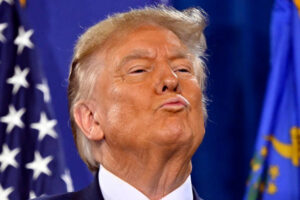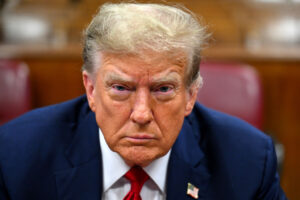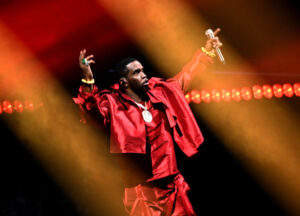Just days before the election, America’s destiny rests on that Valhalla of oddsmakers, Las Vegas. “If we win Nevada, we’re going to win the whole thing,” vowed Trump, and for once he was not exaggerating. Nevada not only holds the key to the presidential outcome, but also the balance of the Senate. In this patch of purple desert, the two combatants are locked in a statistical tie.
The MAGA hopeful is Captain Samuel Boaz Brown, a featured speaker at the Republican National Convention and an army veteran from the war in Afghanistan. His face was disfigured by an improvised explosive device in Afghanistan, making him the personification of the slings and arrows that all-American masculinity must endure. He has been the recipient of $60 million in “dark money” campaign contributions targeting his well-heeled opponent, Jacky Rosen, the only female Jewish member of the Senate, who paid her way through college by working as a waitress at Caesar’s Palace.
In Sin City, the contest is reaching its final frantic stages. Barack Obama recently parachuted in for the cause, declaring that the Nevada race was decisive, and that every vote would count, and that pulling the lever for a woman didn’t automatically qualify you as a cuck. Donald Trump and Kamala Harris have each dropped into the state on several occasions to put in the fix, not to mention their running mates, J.D. Vance and Tim Walz, and surrogates ranging from Bernie Sanders to Vivek Ramaswamy. Nearly three-quarters of Nevada voters live in Clark County, home of the Vegas Strip and more than 1.7 million voters. Yet the outcome of the Silver State’s last Senate race came down to a mere 7,928 votes. Long division yields a rather startling statistic: control of the upper house of the United States Congress could come down to fewer than five votes per precinct.
With the fate of America on the line, I leaped in a cab to the Las Vegas strip, where desperate ads for half-price lawyers gave way to glimmering billboards for semaglutides and Movado watches. As my cab driver Mohammed steered us through the land of Adele and Donny, he shook his head. “This is a very significant election,” he told me. “This country is at a crossroads.” And then, employing the metaphors of his trade, he added rather ominously: “If you make a wrong turn, you may never find yourself again.”
The words turned out to be an apt metaphor for Vegas, where the zonked-out debris of bachelor parties were zombifying aimlessly among the roulette tables, along with the usual assortment of super-sized aloha-shirted psychotics, ladies in overalls and Birkenstocks, and phlegm-hocking old-timers guiding their electric wheelchairs from slot to slot.
I had expected the epicentre for the heavyweight fight between Captain MAGA and “Wacky Jacky” to be bristling with political antagonism, but there was no sign of the impending American moment of truth anywhere. Earlier that day, I had ventured beyond the strip into honky-tonk nowheresville to find Captain Brown’s HQ, hidden among concrete and metal sheds with dusty signs boasting “Houston TX Hot Chicken” and “NY Pizza and Pasta”. But the front doors were locked, and there was not a soul in sight. The Rosen campaign headquarters, nestled among the wedding chapels of South Las Vegas Boulevard, had also been abandoned — most likely for Reno.
The only sign of a fight was on television. I soon lost count of the flat-screens silently spewing American football games, but every time a massive lineman fell to yet another spinal cord injury the broadcast turned to a commercial — and the dire political rhetoric: Sam Brown was an extremist. Sam Brown would push to ban abortion. Sam Brown would take away women’s right to choose. None of which appeared to be having much of an impact on the blackjack dealers — that is, the people that lived in Clark County. One of these locals, an Ethiopian immigrant, appeared surprised that I might ask him about the election, and who he might support. “I have not paid enough attention yet,” he said. “I will next week.”
From the Bellagio, I ambled across the outdoor escalators and pedestrian bridges — where quite a few homeless people had passed out to the sounds of the requisite Elvis impersonator — to Caesar’s Palace. I imagined that here I might find some signs of support for their all-star cocktail waitress alumna, Senator Jacky Rosen, but just as the Old Fashioneds and the Gin Fizzes had transmogrified into Basil Cucumber Margaritas and Kimbo Espresso Martinis, the cocktails are no longer delivered by stiffly smiling twenty-somethings in skimpy outfits trying to scrape enough together for state-school tuition. The ambitious youngsters had in all likelihood switched to more remunerative ventures than tips, such as OnlyFans, while Rosen’s old stomping grounds had become the domain of beefy expat Cubans discussing in great detail the nuances of the Dodgers bullpen as compared to the Yankees. Immigration? The wall? Venezuelan gang violence? Transgéneros playing women’s soccer? Not a word.
It was becoming more and more evident that I had made a big mistake, for I had been under the romantic delusion shared by generations of journalists that among the grand hotels of the mobbed-up, sexed-up, and algorithm-ruled Las Vegas Boulevard, one might catch a preview of America’s dark future. There’s plenty to suggest that the apocalypse begins here: as Lake Mead runs dry, as last summer’s temperature hit 120°F, breaking all previous records, and as sex work and gambling and criminal capitalism have become the norm.
It hasn’t gone unnoticed that America’s worst habits all emanate from here. In 1968, two professors from Yale’s Graduate School of Architecture brought 13 of their students here to study the surreal urban landscape. The result was the book, Learning from Las Vegas, which argued that instead of being viewed as a decadent relic of the dusty western dereliction, Vegas was a harbinger of things to come. Throughout the latter half of the 20th century, flocks of so-called “new journalists” made a name for themselves by studying the human landscape. Hunter S. Thompson’s epic of gonzo journalism, Fear and Loathing in Las Vegas, delivered a premonition of the drug culture that was then a matter of national hysteria, but would soon become humdrum. Joan Didion’s “Marrying Absurd” explored the strip’s strange custom of drive-through nuptials, which rocked her establishment sensibilities. And Tom Wolfe’s maniacal essay for Esquire Magazine, “Las Vegas (What?) Las Vegas (Can’t Hear You! Too Noisy) Las Vegas !!!!” exposed the casinos as the test-case for ADD years before our national attention span dropped to five-seconds with the advent of smartphones. No doubt, the algorithms of cards and dice were precursors to the digital algorithms that have become our nation’s collective addiction.
But if American Armageddon was indeed looming in the casinos of post-MAGA Vegas, it appeared that nobody cared. The city’s gamblers, croupiers and wannabe stars were far too concerned with their own prospects of fame and fortune to fret about America’s fate.
There was, however, one issue that did resound over the din of the jackpots. Sex. Perhaps it was fitting that in Sin City, both Left and Right are leaning into the politics of sex. As might be expected, Captain Brown has praised Florida’s controversial “Don’t Say Gay” legislation, framing the restriction on discussions of sexual orientation and gender identity in schools as a necessary measure to prevent the “indoctrination” of children into queerness. He has opposed marriage equality and supported legislation allowing discrimination against same-sex couples. And as president and chairman of the Nevada Faith and Freedom Coalition, he has decried the Respect for Marriage Act which President Biden signed in 2022, declaring the law an assault on religious freedom. That said, Brown cannot come out as 100% anti-abortion, as 76% of Nevadans support abortion rights.
When it comes to sexual politics, the contrast with Rosen could not be more pronounced. The freshman senator introduced the Equality Act to prohibit discrimination based on sexual orientation and gender identity in employment and housing. She co-sponsored the Respect for Marriage Act, recognises Pride Month, and has been endorsed by the Human Rights Campaign, the nation’s largest lesbian, gay, bisexual, transgender, and queer civil rights organisation.
None of which appeared to matter to the bros at the slot machines, but all of which matters a great deal to Las Vegas’s thriving LGBTQ community. GLAAD estimates that 145,000 LGBTQ people live in Nevada, with more than one in five of them raising children. Nor is it news that if love is love then sex is sex in this neck of the desert, as all the clubs, from high-end Zouk and TAO to cellar dwellers such as the Palomino and Discopussy are as apt to feature gay as straight strippers, and drag show brunches are as prevalent as traditionally cis-gender feathers, leather, and lace.
In this regard, Las Vegas is once again at the forefront of national politics, for the question of LGBTQ rights has come to dominate the American election cycle. The past few years of public outcry over commingling biological males and females in college sports has powered what was once a peripheral issue to the centre of American reaction. So far, various Right-wing PACs have dropped $17 million on more than 30,000 30-second spots attacking Kamala Harris for her stance on transgender athletes, which as National Public Radio noted, were focused on NFL and college football broadcasts.
Sensing liberal weakness on the flashpoint of boys playing with girls, Captain Brown made a point of showing up for a photo-op with the University of Nevada’s Wolf Pack women’s volleyball team, which gained national attention after some members refused to take the court against the San Jose State Spartans, which includes a transgender player. “I stand with them,” declared Brown. “Let’s make sure that this is the fight that we’re in ’til the end.” The issue loomed large over Brown and Rosen’s single debate, impelling the Las Vegas Review to blare the headline: “Transgender sports rift is officially a Nevada election issue.”
Once again, Las Vegas is America’s crystal ball. No doubt, the results in Nevada will provide a peek into the legislative prospects of same-sex marriage, marriage equality, gender-affirming medical treatment, sex education, and various and sundry in-school “Don’t Say Gay” rules and regs all over America. Not to mention the hot-button issue of drag queen story hour for the kiddies, as bans are considered in Arkansas, Idaho, Kentucky, Montana, Oklahoma and Utah.
Forget about climate change and genocide in Sudan. Who cares that the world is teetering on World War Three? In America, where the Dow is up, sex and drugs are cheap, and the cheeseburgers excellent, the question of who will control the nuclear codes has come down to women’s volleyball.
After a while spent contemplating this fact, and four glasses of watered-down Sauvignon Blanc later (the preferred drink of East Coast liberal journalists), I concluded that the most responsible decision would be to head over to the front lines of America’s LGBTQ wars, where multi-millionaire RuPaul, the world’s most famous drag queen, has been running his own franchised version of Trump’s The Apprentice: RuPaul’s Drag Race Live! Las Vegas. As I purchased the $100 ticket, I had no doubt that it was here that America’s most sex-positive city would deliver its referendum as to whether or not the push for LGBTQ rights had gone too far — or not far enough.
RuPaul’s eponymous show was running at The Flamingo, a somewhat down-market hotel and casino across the street from The Bellagio and Caesar’s Palace, which refreshingly offers no pretence of grandeur. The second show of “Queens Are Wild” Drag Race began late, so the alcohol had had plenty of time to achieve its cumulative effects on the tourists, who were boozily cheering each other on at the tables. I waited in line, madly deleting tsunamis of Jacky Rosen fundraising e-mails from my phone, which were now landing at a frantic pace. If she didn’t get her $750,000 by midnight, she’d be cooked.
I’m not a heavy consumer of the drag show, so it came as a surprise that ground zero of the trans menace emanated a rather wholesome vibe, completely lacking in the creepy concupiscence wafting over from the XX strippers on stage a dozen or so steps to the left. I was also delighted to find that RuPaul drag race fans are an intellectual lot, as the two women from Cedar Rapids, Iowa, who shared my table held forth on the nuances of every queen going back 16 seasons.
The lights dimmed and then, for the first time since I’d landed, there was Kamala Harris in her lavender pants suit, flashing her smile on giant twin screens. Quiet engulfed the crowd as her voice filled the room. “We are all in this together,” she said. “Your vote is your power.” The crowd erupted into a spontaneous amen — yes, quite literally, “Amen”. Carried away by religious fervour, the two women from Iowa gleefully shouted: “You better work, Bitch!”
I shouldn’t have been shocked by such an enthusiastic response. After all, the greatest political motivator is victimhood. Trump plays the card all the time, hustling his mugshot t-shirts and bloody-ear coffee mugs, declaring the libs are coming after him endlessly, unfairly, unjustly. So why shouldn’t the LGBTQ community and their allies use their own persecution by anti-gay legislators as a means of rallying the base — even if Kamala’s lavender pants-suit was giving off a strictly asexual Hillary Clinton vibe.
After a Seventies disco number and a cheeky Britney hit, it seemed absolutely normal to see Barack Obama appear on those same gigantic screens, reminding us of the politics of love. In doing so, he cemented the unlikely fact that a drag show at The Flamingo was the one place in Clark County, Nevada that was fully realising our fraught political moment. Who would have expected such political punch from a show featuring sculpted dance boys wearing assless purple chaps? Or that the half-naked crew would reach their writhing climax holding placards with the plea: “Register to Vote.”
It was a refreshing moment: a community under attack was fighting the good fight. There was, perhaps, some hope left for America. Either that, or we were all about to be consumed by terminal victimhood. And so it was back to the chaos of the casino floor, where the future was as secure as craps.
Disclaimer
Some of the posts we share are controversial and we do not necessarily agree with them in the whole extend. Sometimes we agree with the content or part of it but we do not agree with the narration or language. Nevertheless we find them somehow interesting, valuable and/or informative or we share them, because we strongly believe in freedom of speech, free press and journalism. We strongly encourage you to have a critical approach to all the content, do your own research and analysis to build your own opinion.
We would be glad to have your feedback.
Source: UnHerd Read the original article here: https://unherd.com/




